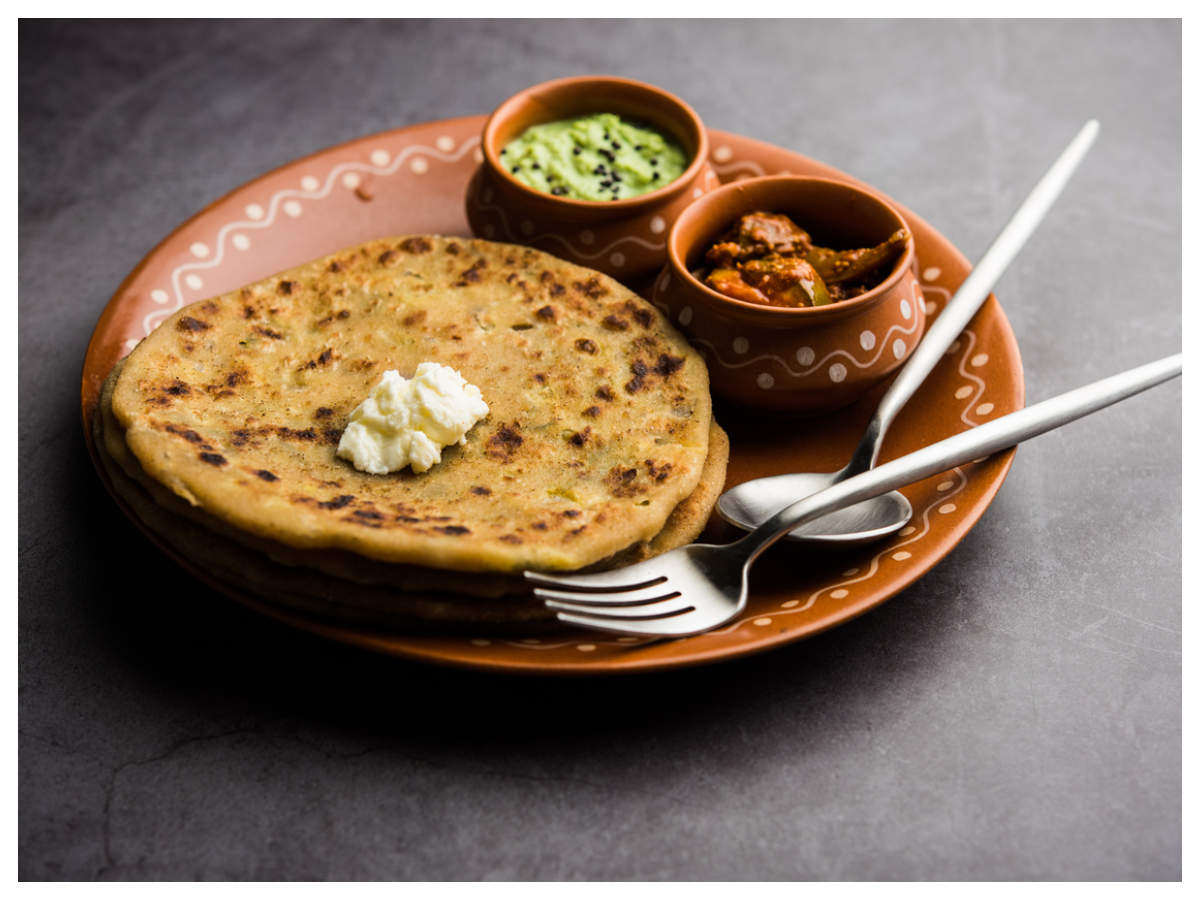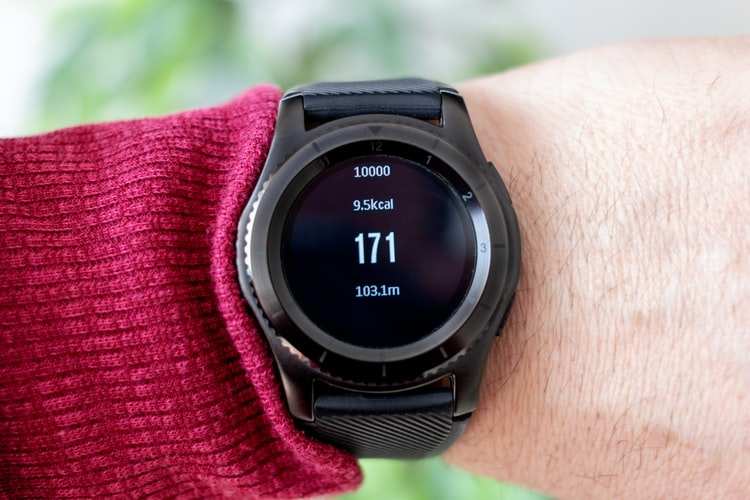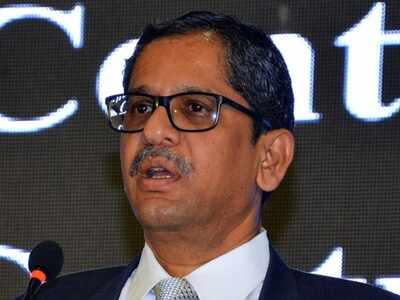
NEW DELHI: The Supreme Court is facing yet another controversy, with Andhra Pradesh CM Y S Jaganmohan Reddy levelling serious allegations against Justice N V Ramana who is scheduled to take over as Chief Justice of India from the incumbent, Justice S A Bobde, in April next year.
The young CM has, in essence, alleged a nexus between his principal rival, his predecessor N Chandrababu Naidu, and Justice Ramana who also belongs to Andhra Pradesh. In his letter to CJI Bobde, Reddy has alleged that Naidu helped Justice Ramana’s family make fast money and the latter has sought to return the favour by influencing the high court to impede the functioning of his government.
At the centre of his litany is the insinuation that Justice Ramana’s family made a killing by purchasing land in Amaravati, which Naidu had planned to develop as the state capital in the wake of the loss of Hyderabad to Telangana.
A perusal of documents by TOI showed that daughters of the SC judge, in fact, bought land from a local property dealer just like thousands of others who purchased land in Amaravati after the formation of the separate state of Telangana had looked inevitable and because of the realisation that Andhra Pradesh would not be able to hold on to Hyderabad.
Also, the prospect of Amaravati being developed as the new capital predated the formation of the Naidu government. In February 2014, then Union minister Panabaka Lakshmi had announced the choice of Amaravati, in the Guntur-Vijayawada region, as the new capital of Andhra Pradesh after its bifurcation and Justice Ramana and his daughters did not need any exclusive tipoff from the TDP government about the certain prospect of appreciation of investments in land there. They bought land in June 2015.
The sequence of events leading to Reddy’s sensational letter to the CJI has also been linked to the timing of the registration of FIRs against Justice Ramana’s daughters and other alleged beneficiaries of the Amaravati land scam. The AP government moved just a day before a bench headed by him pushed for fast-tracking trials in criminal cases against MPs and MLAs, serving as well as former.
Many see the “coincidence” as significant, their estimate echoing the suggestion that Justice Ramana weaponised the PIL seeking fast trial of cases against lawmakers facing serious criminal charges, which could have implications for the AP chief minister who faces several cases.
In this hurry to forge a linkage, what has been glossed over is the chain of events which shows that the case landed before a bench headed by Justice Ramana because of sheer circumstance. For, the decision to expedite trial of cases against influential and resourceful politicians which was progressing, if at all, at a snail’s pace, was taken on December 4, 2018, by the then CJI Ranjan Gogoi. After his superannuation, it got assigned to the CJI Bobde. However, as his daughters had appeared for parties involved in the case, he on March 2 entrusted monitoring of the PIL by Ashwini Kumar Upadhyay for expeditious trial of cases against politicians to a bench headed by Justice Ramana.
The bench, comprising Justices Ramana, Surya Kant and Hrishikesh Roy, on September 10 asked the Centre to respond to a new prayer seeking lifetime ban on convicted politicians on the same lines as convicted bureaucrats getting barred from government employment. The SC was informed by amicus curiae Vijay Hansaria that as many as 4,442 criminal cases were pending against former and sitting MPs and MLAs across states. The bench fixed September 16 for further hearing on the matter.
“A total of 4,442 cases are pending against MPs/ MLAs (sitting and former) in different courts. In 2,556 cases, sitting legislators are accused persons. There are 413 cases in respect of offences, which are punishable with imprisonment for life, out of which in 174 cases, sitting MPs/ MLAs are accused,” the amicus had informed the SC.
The September 16 order of the bench led by Justice Ramana set off alarm bells for politicians in power as it asked chief justices of all HCs to formulate action plans on requirement of special courts exclusively for trial of criminal cases against present and former legislators while keeping in view the following parameters: total number of pending cases in each district, number of special courts required for speedy trial, existing number of special courts, number of judges and subject categories of the pending cases, tenure of the judges to be designated, number of cases to be assigned to each judge, expected time for disposal of the cases, distance between the designated courts, and requirement of infrastructure.
But the trouble facing politicians cannot be put down to an initiative by Justice Ramana. Reddy has also accused Justice Ramana of influencing a series of orders of AP high court which have gone against his government. While it is difficult to comment on the merit or lack of it on each order, the insinuation that a single SC judge can have a vice-like grip over a whole set of judges, besides being an indictment of the entire higher judiciary, betrays ignorance of the complex dynamics of the administration of justice, including appointment of judges who made it to the bench at different points in time and who may not be having the same predilection, personal or political.
On October 6, the bench had asked for additional information from HCs in a tabulated form to enable passing substantive orders to fast-track long pending criminal trials that had been put on the back burner because of the influence as well as money and muscle power of politicians. This triggered further reaction in the form of Reddy writing a letter to the CJI.
The young CM has, in essence, alleged a nexus between his principal rival, his predecessor N Chandrababu Naidu, and Justice Ramana who also belongs to Andhra Pradesh. In his letter to CJI Bobde, Reddy has alleged that Naidu helped Justice Ramana’s family make fast money and the latter has sought to return the favour by influencing the high court to impede the functioning of his government.
At the centre of his litany is the insinuation that Justice Ramana’s family made a killing by purchasing land in Amaravati, which Naidu had planned to develop as the state capital in the wake of the loss of Hyderabad to Telangana.
A perusal of documents by TOI showed that daughters of the SC judge, in fact, bought land from a local property dealer just like thousands of others who purchased land in Amaravati after the formation of the separate state of Telangana had looked inevitable and because of the realisation that Andhra Pradesh would not be able to hold on to Hyderabad.
Also, the prospect of Amaravati being developed as the new capital predated the formation of the Naidu government. In February 2014, then Union minister Panabaka Lakshmi had announced the choice of Amaravati, in the Guntur-Vijayawada region, as the new capital of Andhra Pradesh after its bifurcation and Justice Ramana and his daughters did not need any exclusive tipoff from the TDP government about the certain prospect of appreciation of investments in land there. They bought land in June 2015.
The sequence of events leading to Reddy’s sensational letter to the CJI has also been linked to the timing of the registration of FIRs against Justice Ramana’s daughters and other alleged beneficiaries of the Amaravati land scam. The AP government moved just a day before a bench headed by him pushed for fast-tracking trials in criminal cases against MPs and MLAs, serving as well as former.
Many see the “coincidence” as significant, their estimate echoing the suggestion that Justice Ramana weaponised the PIL seeking fast trial of cases against lawmakers facing serious criminal charges, which could have implications for the AP chief minister who faces several cases.
In this hurry to forge a linkage, what has been glossed over is the chain of events which shows that the case landed before a bench headed by Justice Ramana because of sheer circumstance. For, the decision to expedite trial of cases against influential and resourceful politicians which was progressing, if at all, at a snail’s pace, was taken on December 4, 2018, by the then CJI Ranjan Gogoi. After his superannuation, it got assigned to the CJI Bobde. However, as his daughters had appeared for parties involved in the case, he on March 2 entrusted monitoring of the PIL by Ashwini Kumar Upadhyay for expeditious trial of cases against politicians to a bench headed by Justice Ramana.
The bench, comprising Justices Ramana, Surya Kant and Hrishikesh Roy, on September 10 asked the Centre to respond to a new prayer seeking lifetime ban on convicted politicians on the same lines as convicted bureaucrats getting barred from government employment. The SC was informed by amicus curiae Vijay Hansaria that as many as 4,442 criminal cases were pending against former and sitting MPs and MLAs across states. The bench fixed September 16 for further hearing on the matter.
“A total of 4,442 cases are pending against MPs/ MLAs (sitting and former) in different courts. In 2,556 cases, sitting legislators are accused persons. There are 413 cases in respect of offences, which are punishable with imprisonment for life, out of which in 174 cases, sitting MPs/ MLAs are accused,” the amicus had informed the SC.
The September 16 order of the bench led by Justice Ramana set off alarm bells for politicians in power as it asked chief justices of all HCs to formulate action plans on requirement of special courts exclusively for trial of criminal cases against present and former legislators while keeping in view the following parameters: total number of pending cases in each district, number of special courts required for speedy trial, existing number of special courts, number of judges and subject categories of the pending cases, tenure of the judges to be designated, number of cases to be assigned to each judge, expected time for disposal of the cases, distance between the designated courts, and requirement of infrastructure.
But the trouble facing politicians cannot be put down to an initiative by Justice Ramana. Reddy has also accused Justice Ramana of influencing a series of orders of AP high court which have gone against his government. While it is difficult to comment on the merit or lack of it on each order, the insinuation that a single SC judge can have a vice-like grip over a whole set of judges, besides being an indictment of the entire higher judiciary, betrays ignorance of the complex dynamics of the administration of justice, including appointment of judges who made it to the bench at different points in time and who may not be having the same predilection, personal or political.
On October 6, the bench had asked for additional information from HCs in a tabulated form to enable passing substantive orders to fast-track long pending criminal trials that had been put on the back burner because of the influence as well as money and muscle power of politicians. This triggered further reaction in the form of Reddy writing a letter to the CJI.
Download
The Times of India News App for Latest India News

Coronavirus outbreak
Trending Topics
LATEST VIDEOS
India
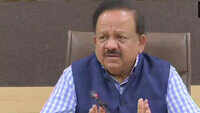 Must avoid large gatherings in festival season: Health minister
Must avoid large gatherings in festival season: Health minister  Gymnast Dipa Karmakar flags off cycle rally in Agartala
Gymnast Dipa Karmakar flags off cycle rally in Agartala  Mangaluru student develops ‘AgriBot’ to assist farmers
Mangaluru student develops ‘AgriBot’ to assist farmers 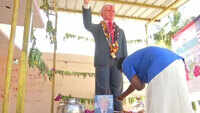 Donald Trump’s ‘biggest fan’ in India dies of cardiac arrest
Donald Trump’s ‘biggest fan’ in India dies of cardiac arrest 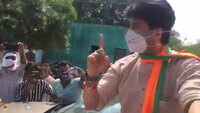 MP bypolls: Jyotiraditya calls himself 'Maharaja Scindia', Congress fires salvo
MP bypolls: Jyotiraditya calls himself 'Maharaja Scindia', Congress fires salvo  Shopian school under scanner after 13 students found linked to terror groups
Shopian school under scanner after 13 students found linked to terror groups
More from TOI
Navbharat Times
Featured Today in Travel
Quick Links
Coronavirus in MumbaiCoronavirus in KolkataCoronavirus in HyderabadCoronavirus in DelhiCoronavirus in BangaloreCoronavirus symptomsCoronavirus in IndiaWhat is CoronavirusCoronavirus NewsSolar EclipseNPRWhat is NRCCAB BillCAB and NRCRTI BillPodcast newsLok SabhaShiv SenaYSRCPCongressBJP newsUIDAIIndian ArmyISRO newsSupreme Court
Get the app
